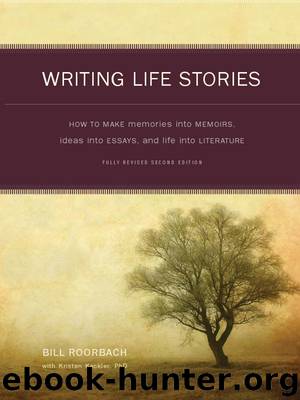Writing Life Stories by Bill Roorbach

Author:Bill Roorbach
Language: eng
Format: epub
Tags: ebook, book
Publisher: Penguin Publishing Group
Published: 2011-04-21T16:00:00+00:00
The Internet is just the world passing around notes in a classroom.
—Jon Stewart
EXERCISE THREE: The Half-Hour Year
Here’s something fun for the Internet. Pull up one of your scenes or essays or exercises, one that’s about finished. What year or years does the essay cover? What year marks the present of your memoir?
Now, set a stove timer or cell-phone alarm clock or hourglass for thirty minutes (or maybe forty-five, max, if you’re slow on the keyboard). The time limit is just to keep you from spending the next eight hours online—seven and a half hours of which you could be writing!
OK, here’s the assignment: Simply use the Internet (in any way you see fit, including search engines, library databases, corporate networks) to compile a quirky list of events from your year, things you find interesting or surprising or curious. Who made the news? What brand of car had a snazzy new model? Who had the number-one hit on Billboard’s Top 40? What were the disasters? Who was in the White House, and what was he saying? What were the top movies? Follow your nose through 1967, say, or 1991.
Now look back at your memoir or essay or scene, and make a point of weaving the era into your paragraphs. Let the facts of the day help establish a sense of time and place more concrete than your memory has allowed. Let the world of your selected year help provide a context for your scenes, your discussions. Let new knowledge of the era lead to new ideas for your writing.
PUBLIC RECORDS
Let’s say you want to write about your great-grandfather’s crazy life. Let’s say it was so unconventional that no one talked about him much. Let’s say that all those who remember the old bird are dead and gone, too. How might you track him down?
All kinds of records are carefully kept and carefully stored (and sometimes carefully concealed) by government, big and small. I’m indebted to investigative reporter Cheryl Reed Stricharchuk for some of the following ideas:
1. Property records at a county recording office might tell you which houses Grandpa owned, when he moved, and will give dollar values, as well.
2. Court records may turn up divorces, marriages, name changes, deaths, civil suits, criminal trials.
3. Probate records will show deaths and inheritances, the latter sometimes in fascinating detail.
4. Police records (available at county clerks’ offices and at police department records divisions) will give voluminous information on convictions, arrests, even detailed reports from detectives’ investigations.
Grandpa!
And there are myriad other public records: corporation and incorporation records at the Secretary of State’s office, annual Securities and Exchange Commission reports, nonprofit corporation reports, campaign contributions, loan records, minutes of meetings, transcripts of speeches, health inspections, driving records, on and on.
Some of my more intrepid students have used the Freedom of Information Act (www.usdoj.gov/oip/) to get incredible material about activist parents, for example, or public figures. One student got hold of his own FBI file from the 1960s after prolonged, deathly dull, and daunting interchanges with bureaucrats.
Download
This site does not store any files on its server. We only index and link to content provided by other sites. Please contact the content providers to delete copyright contents if any and email us, we'll remove relevant links or contents immediately.
| Anthologies | Short Stories |
The Tidewater Tales by John Barth(12659)
Kathy Andrews Collection by Kathy Andrews(11832)
Tell Tale: Stories by Jeffrey Archer(9037)
This Is How You Lose Her by Junot Diaz(6887)
The Mistress Wife by Lynne Graham(6490)
The Last Wish (The Witcher Book 1) by Andrzej Sapkowski(5467)
Dancing After Hours by Andre Dubus(5280)
The Sympathizer by Viet Thanh Nguyen(4390)
Be in a Treehouse by Pete Nelson(4051)
The Secret Wife by Lynne Graham(3925)
Maps In A Mirror by Orson Scott Card(3901)
Tangled by Emma Chase(3760)
Ficciones by Jorge Luis Borges(3635)
The House on Mango Street by Sandra Cisneros(3472)
A Knight of the Seven Kingdoms by George R R Martin(3371)
Girls Who Bite by Delilah Devlin(3257)
You Lost Him at Hello by Jess McCann(3074)
MatchUp by Lee Child(2883)
Once Upon a Wedding by Kait Nolan(2794)
